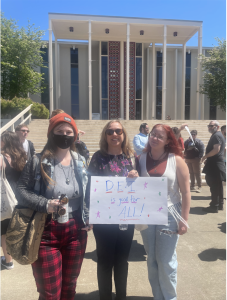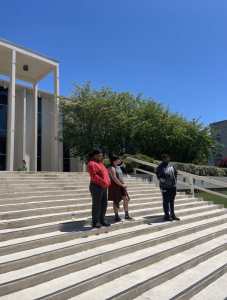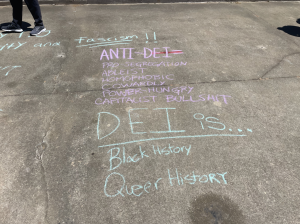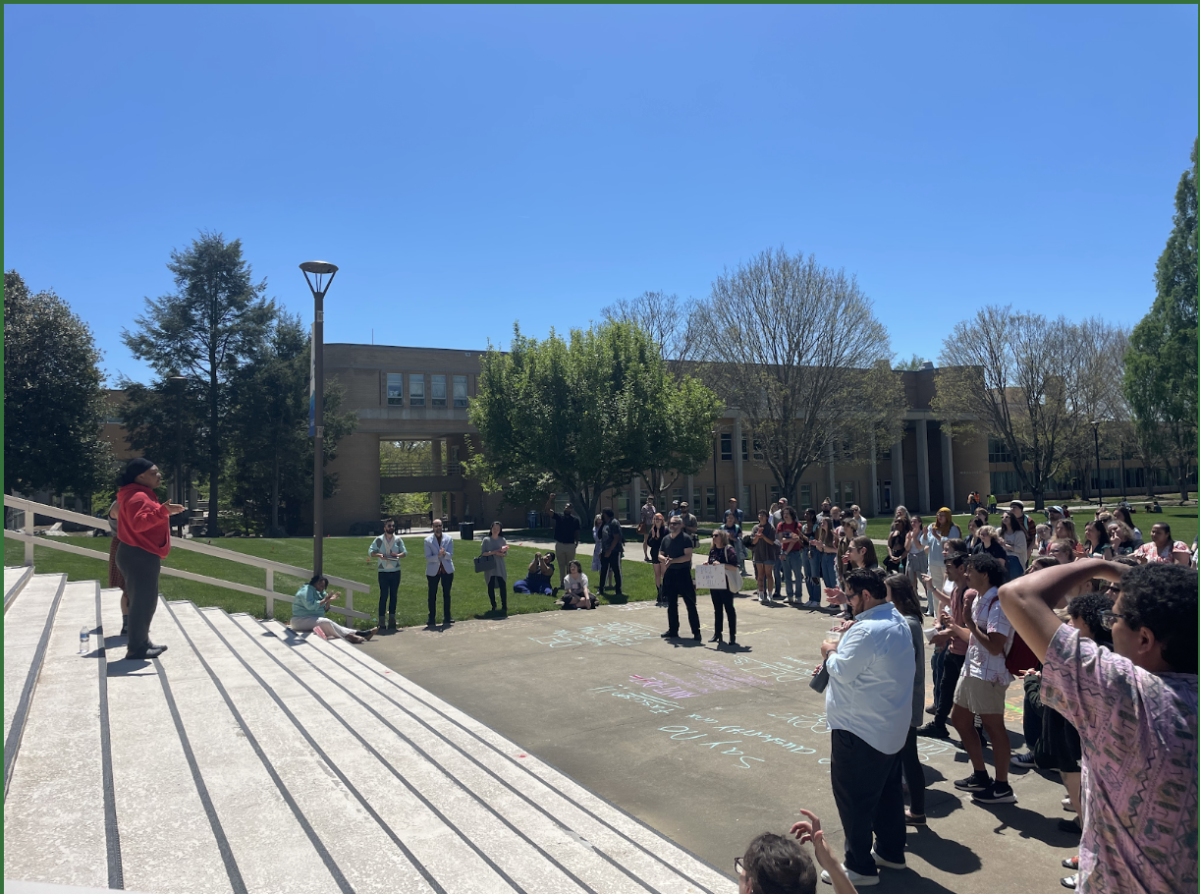Dozens of UNC Asheville students, faculty and staff gathered on the Ramsey Library steps yesterday to protest a new UNC System Board of Governors Committee policy that could remove diversity, equity and inclusion positions across the system by next September.
“The general and overarching consensus I’ve been hearing both in and out of SGA is that students are not only appalled and horrified, but furious with the BOG for underhandedly attacking programs and offices and jobs while behind closed doors despite these DEI programs exponentially benefiting the UNC-system and our marginalized students,” said Liv Barefoot, Vice President of the Student Government Association at UNC Asheville.
If the policy, titled Equality Within the University of North Carolina, is approved by the full Board of Governors on May 23, it would require universities to remove staff and offices on campuses that explicitly support DEI efforts, reallocate funds from DEI efforts to “initiatives related to student success and wellbeing” and show compliance to “institutional neutrality” annually.
At the committee meeting, the policy explanation took less than a minute, and the motion to approve the policy lasted approximately 10 seconds. The committee held no discussion and did not ask questions.
The UNC Association of Student Governments president and student at Western Carolina University Estefany Gordillo-Rivas said that typically there are committee conversations leading up to these proposals, but she was “unaware of specific meeting dates where the full committee met regarding this policy.”
“The committee meeting was the first discussion. The ASG member was present for the meetings—I can’t say for certain she was in that session,” said Andy Wallace, the Director of UNC System Media Relations.
In 2023, more than 80 anti-DEI bills like this one were introduced across U.S. states, according to the Chronicle of Higher Education.
Eight-three students said in a survey at the protest that they would not have enrolled in a UNC system school if it did not have DEI initiatives in place.
Faculty and staff also spoke about the policy at the protest.
“It didn’t used to be like this. We didn’t have to bring out signs that say we value diversity, equity and inclusion. It was an inherent value,” said Ellen Perry, English professor and ‘97 alumna.


“A big part of the DEI policy is recruiting and retaining students. The system is shooting itself in the foot if we do this because we are not going to be able to recruit,” said Ian Biers, associate professor of French. “It’s going to drive away high quality faculty and students.”
When multiple UNC System office staff were asked to comment, Wallace spoke on the system’s behalf, saying – “the proposed policy supports inclusion, not exclusion.”
Wallace is referring to section six of the policy that states: “Campuses shall ensure that qualified students of all backgrounds are welcomed, included and supported in their pursuit of a degree or certificate and that employee wellbeing remains a priority.”
How might this affect UNC Asheville?
“My office is likely to be impacted; however, I do not know how and in what ways so I do not know if I can firmly comment on this one,” said Carlton Smith, director of the Office of Multicultural Affairs OMA, one of the main DEI offices on campus.
Kimberley Nava Eggett, director of UNC Asheville’s Center for Diversity Education is unsure how the CDE will be affected.
Classes are not included in the new BOG DEI policy currently.
“This proposed policy has no impact on majors/course offerings, material taught within the classroom or research being performed,” said Wallace.
However, although classes are not directly tied to DEI offices, many of them rely on the support of DEI offices. UNC Asheville requires students to take a Diversity Intensive course or a U.S. Race/Ethnicity-Centric DI-R Course, which DEI offices support.
“We anticipate that DEI offices support students who desire to take DI classes or who seek additional consult and support for themselves and on related topics while or after taking DI courses,” said Ameena Batada, the Coordinator for Diversity Intensive Courses. “DEI offices can be great resources for all faculty, including those who teach DI courses.”

The university also hosts several DEI hires, known as “University Fellows.” The fellowship was founded to “support the development of a more excellent and diverse professoriate at UNC Asheville,” and fellows receive mentorship and support for “the development of their pedagogy,” according to the job description.
The job description also listed UNC Asheville as “an Equal Employment Opportunity/Affirmative Action employer.”
Sananda Sahoo, a fellow and professor of Mass Communication, said she “has not heard from UNCA yet” and does not know how this new policy will affect DEI hires.
Remi Poindexter, another fellow and professor of Art History, said he understood the fellowship to be “a two-to-three-year fellowship that had the potential to be converted to a tenure-track job at the end.”
This anti-DEI policy began long before the vote
Last February, the BOG approved a policy prohibiting “compelled speech,” reiterating a NC House bill titled “Prohibit Compelled Speech/Higher Ed.” Both the policy and bill prohibit UNC institutions from asking employment applicants to describe beliefs around “contemporary political debate or social action.”
Yet, these legislative orders did not clarify the specific prohibited topics until last June when the NC General Assembly overrode Democratic Gov. Roy Cooper’s veto and passed Senate Bill 364.
Since the bill became effective in December 2023, state employees are now restricted from endorsing the ideas that “all Americans are not created equal” and that a government is “inherently racist or sexist,” among 11 other similar concepts.
A week before the UNC System BOG approved the anti-DEI policy, Republican House Speaker Tim Moore deferred SB 364 from the NC General Assembly to the UNC System BOG.
If the Board of Governors approves this new policy, the UNC System would mirror the state legislature’s stance on DEI, as the BOG policy also prohibits the specific “matters of contemporary political debate or social action.”
Additionally, the policy would require institutions to fund a broad category of “student success” in lieu of DEI.
This focus on DEI funds began last year in March, when the General Assembly’s Joint Legislative Commission on Government Operation requested information on DEI programs, including costs.
Then last month, Marty Kotis, vice-chair of the board’s Budget, Finance and Infrastructure committee said UNC Chapel Hill’s $3.7 million spent on DEI efforts “could be better used on a host of other needs on campus.”
But this policy leaves one exception: student-led organizations could continue funding DEI, according to Wallace.
“An example would be when Residential Living does RA training, paying a speaker or a course to discuss DEI would not be allowed,” Gordillo-Rivas said. “However, if a student organization has funds, they themselves can organize DEI efforts or get allocated funds to organize a speaker.”
This anti-DEI effort does not exist in a vacuum
“Though this feels like it happened suddenly, there has been a trend across other states that have followed this pattern, but is now hitting us at home,” Nava Eggett said.
This policy joins the more than 80 anti-DEI bills introduced in 2023, according to the Chronicle of Higher Education.
For instance, last May, Florida’s Gov. Ron DeSantis signed a bill that prohibited state public universities from spending money on DEI initiatives. By January 2024, the Florida Board of Governors for the University System of Florida approved a policy replicating the state bill, and by March of 2024 the University of Florida eliminated all DEI positions.
A similar process in Texas led to more than 100 DEI job cuts at public universities.
The Wyoming legislature pulled state funding from the University of Wyoming Diversity Office and Gender Studies department.
And in June 2023, the United States Supreme Court overturned a 46-year precedent in ruling against affirmative action, saying it violates the Equal Protection Clause of the 14th Amendment.
This ruling prompted a new UNC System guideline stating that institutions should “eliminate written policies and unwritten practices on consideration of race” and “diversity cannot mean anyone’s ideal mix of racial identities on campus.” UNC also had to pay an anti-affirmative action group $4.8 million due to the Supreme Court loss.
ASG students responded to the new guideline with a statement: “We believe diversity, equity, inclusion and accessibility are essential to the success of our institutions and affirmative action is a necessary tool to achieve these goals.”
What could be expected moving forward?
Asheville’s UNC system faculty assembly representative, Toby King, is gathering faculty and student feedback to submit to the UNC System faculty assembly. Batada said this will provide representation for “faculty from across the UNC system.”


An SGA student feedback survey is also being passed around campus.
ASG is working on a resolution and response against this policy, according to Barefoot.
Moraguez said to call both UNC system representatives and state legislators about this policy as “both entities have the ability to shape UNC system policy, even if the system is the one acting in this instance.”
Blu Buchanan, a UNC Asheville professor of sociology and anthropology, is connecting students to working groups and can be reached through their email: [email protected].
The full policy can be read here.



















